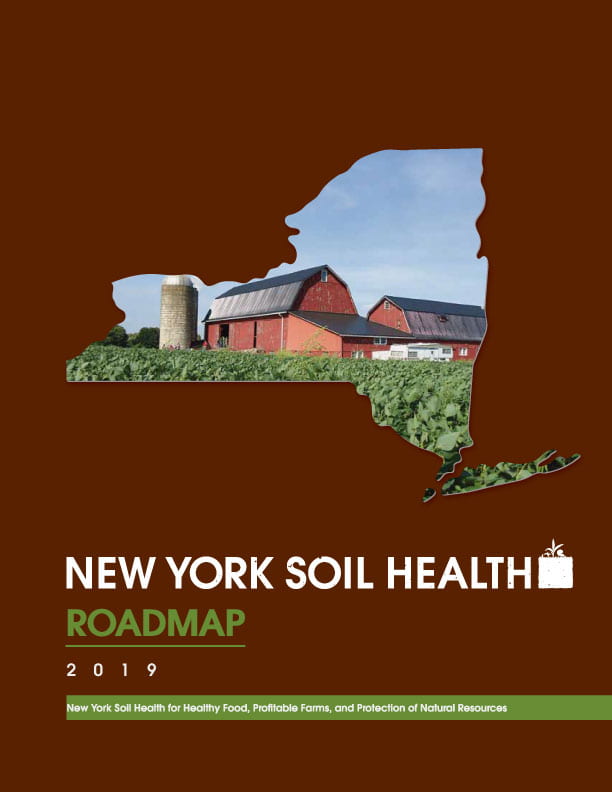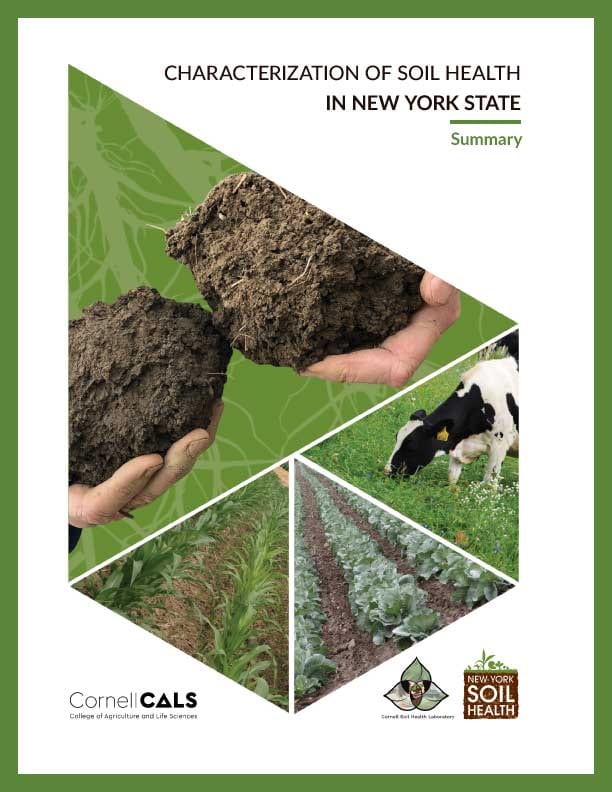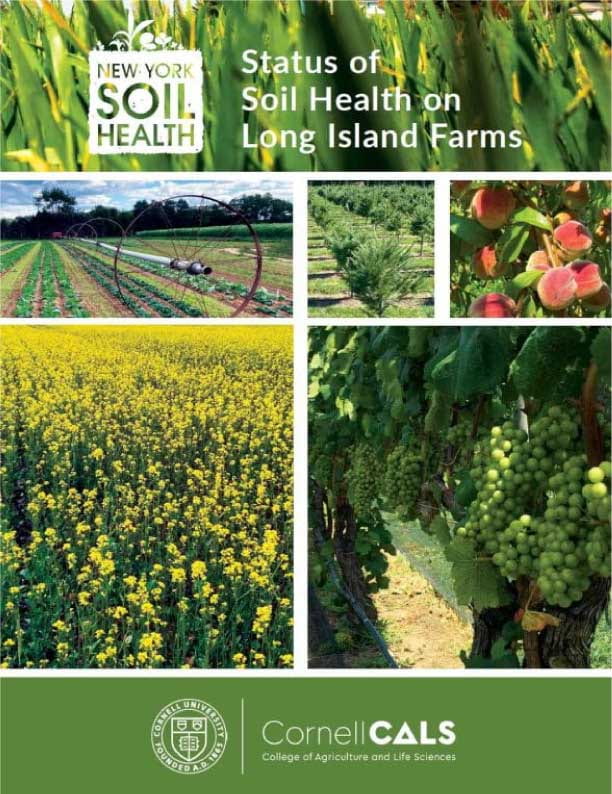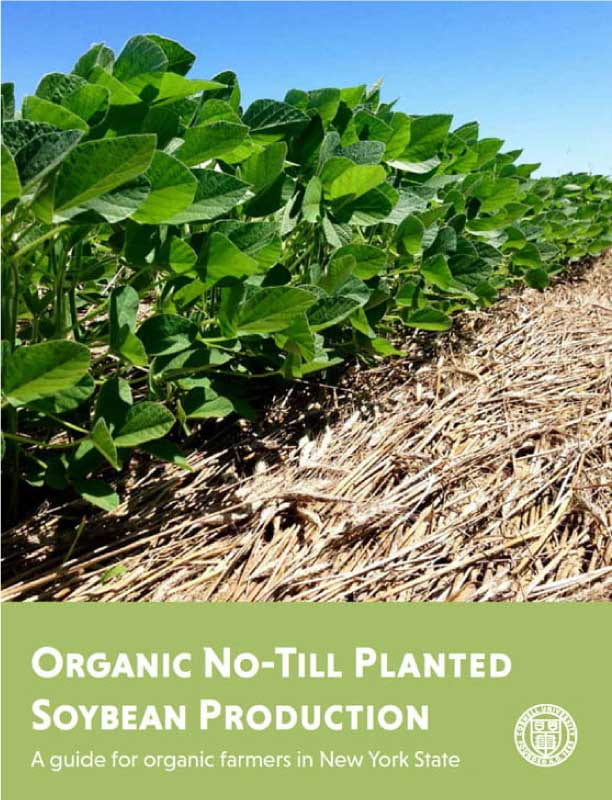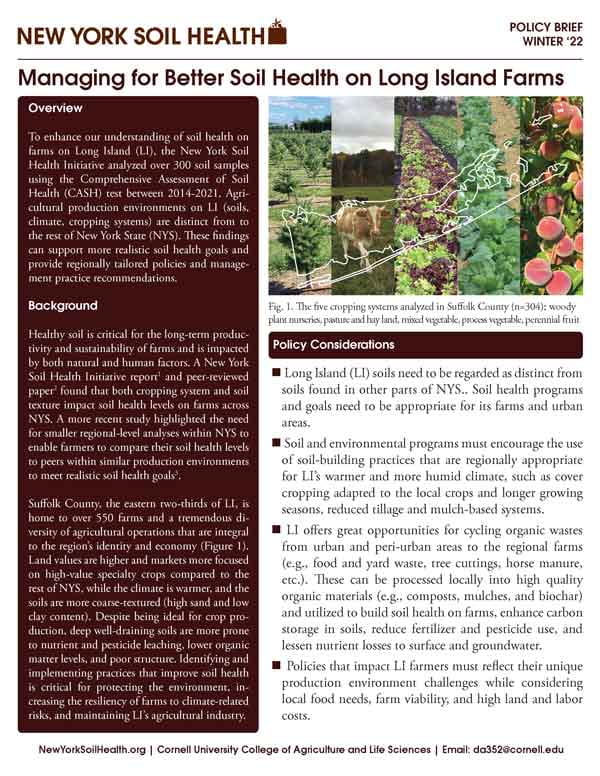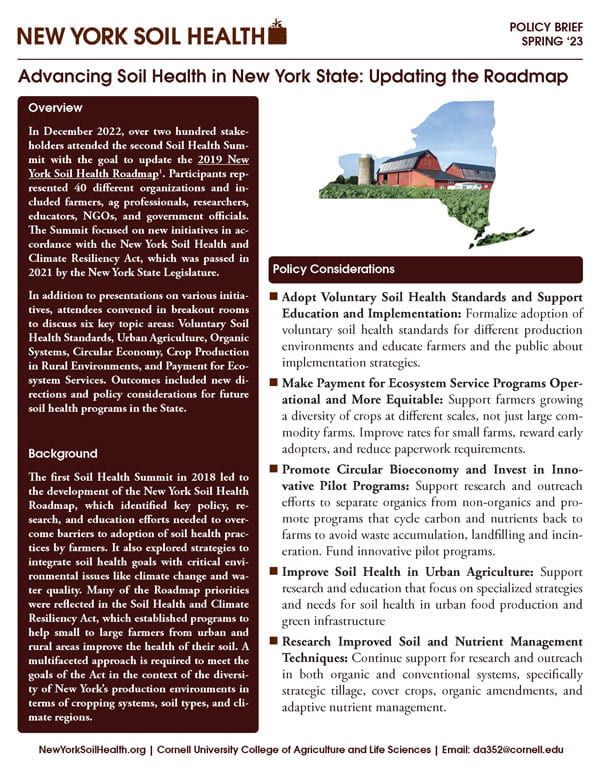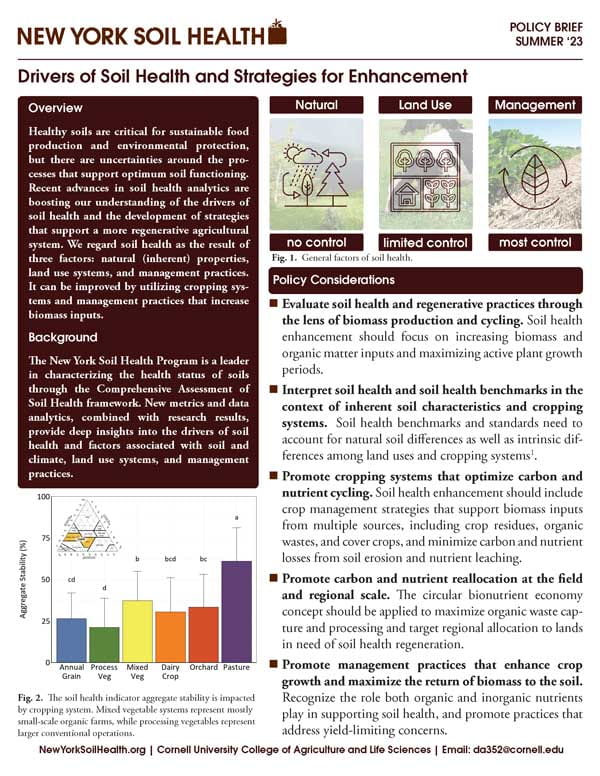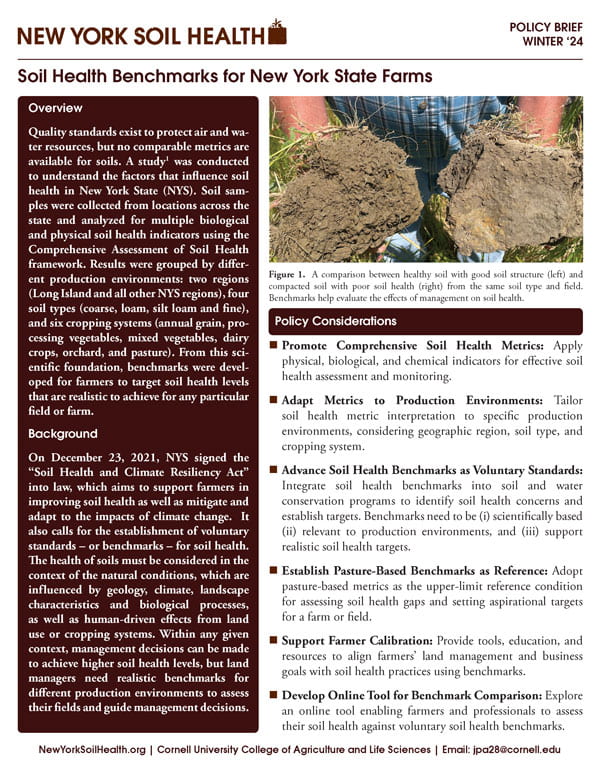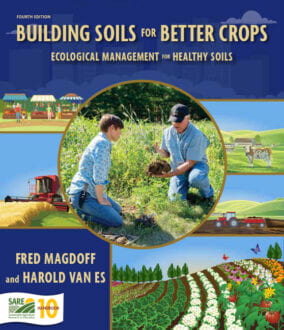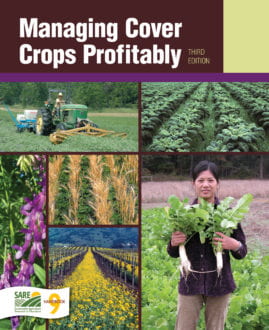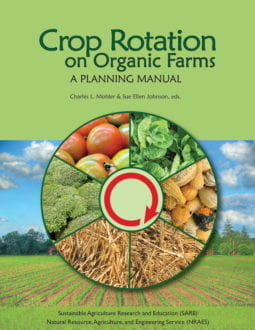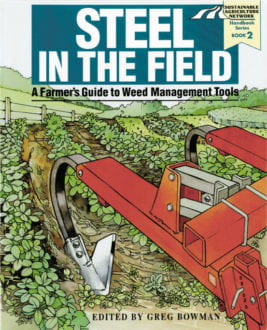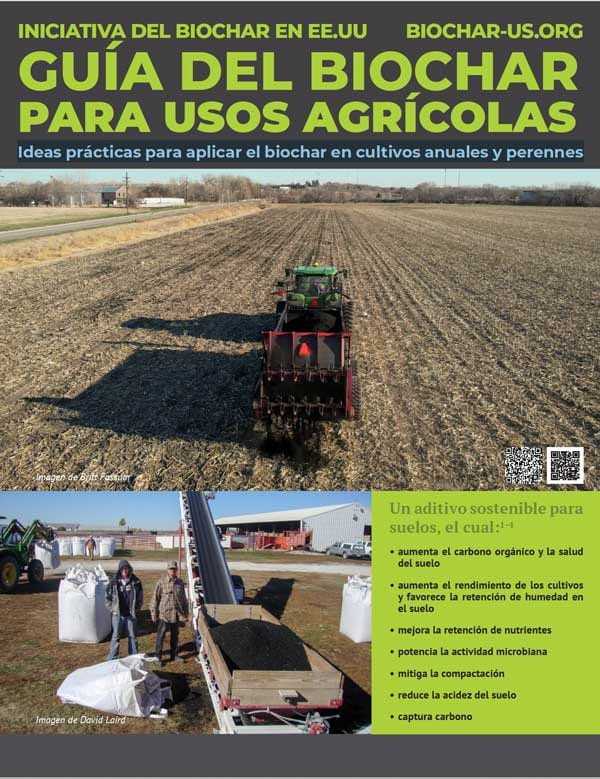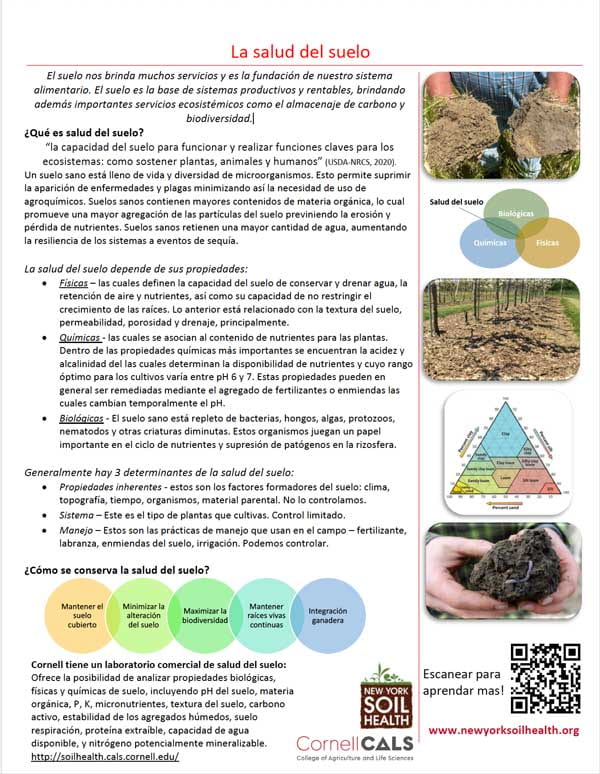Resources
Information, links, and videos to help you advance soil health. Please be in touch if you have any suggestions.
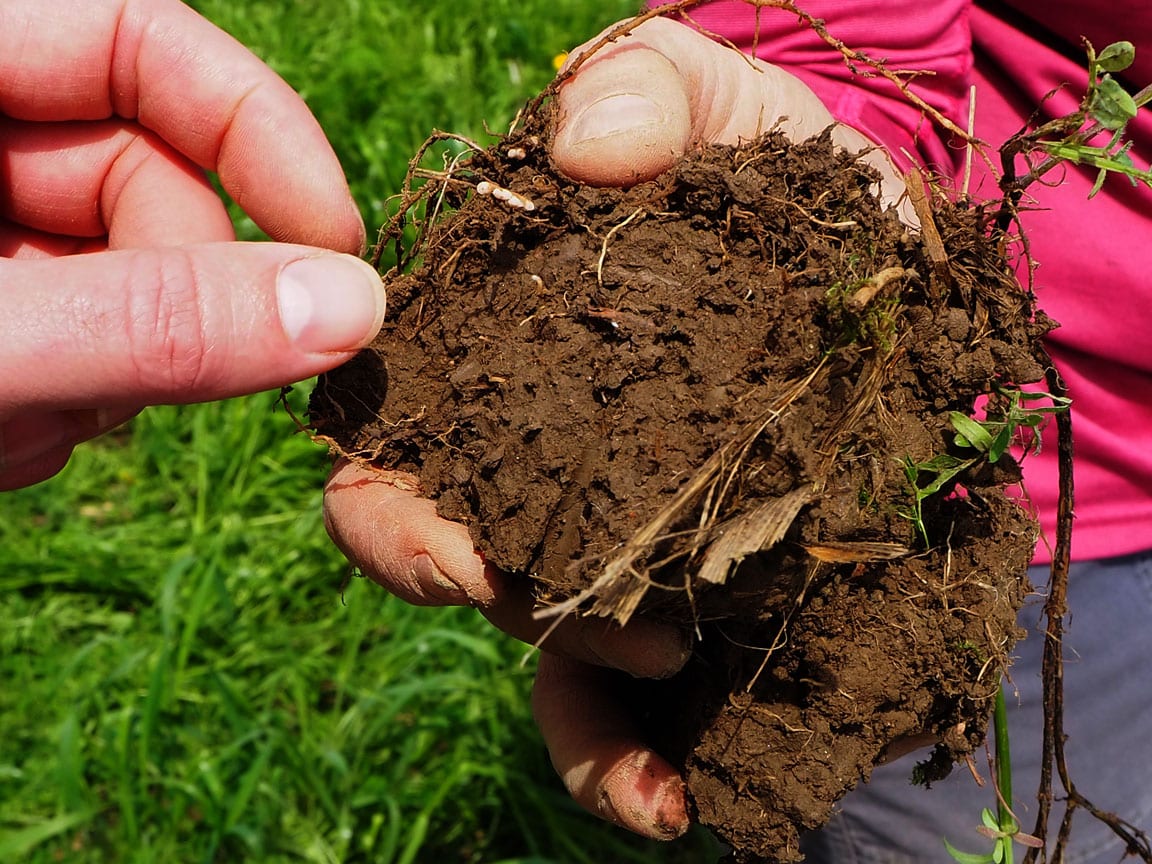
What kind of information are you looking for?
Videos
New York Soil Health Guides & Reports
New York Soil Health Policy Briefs
The New York Soil Health Policy Briefs are essential resources designed to distill research findings into easily understandable language and provide evidence-based recommendations. These briefs aim to assist a wide audience, including policymakers and stakeholders, in making informed decisions to advance soil health initiatives. View Policy Brief page.
Cornell Soil Health Training
- Practical Soil Health Specialist Training – information about the 2020-2021 program
- Advanced Soil Health Course – information about the Fall 2023 program (opens another website)
Cornell Soil Health Lab
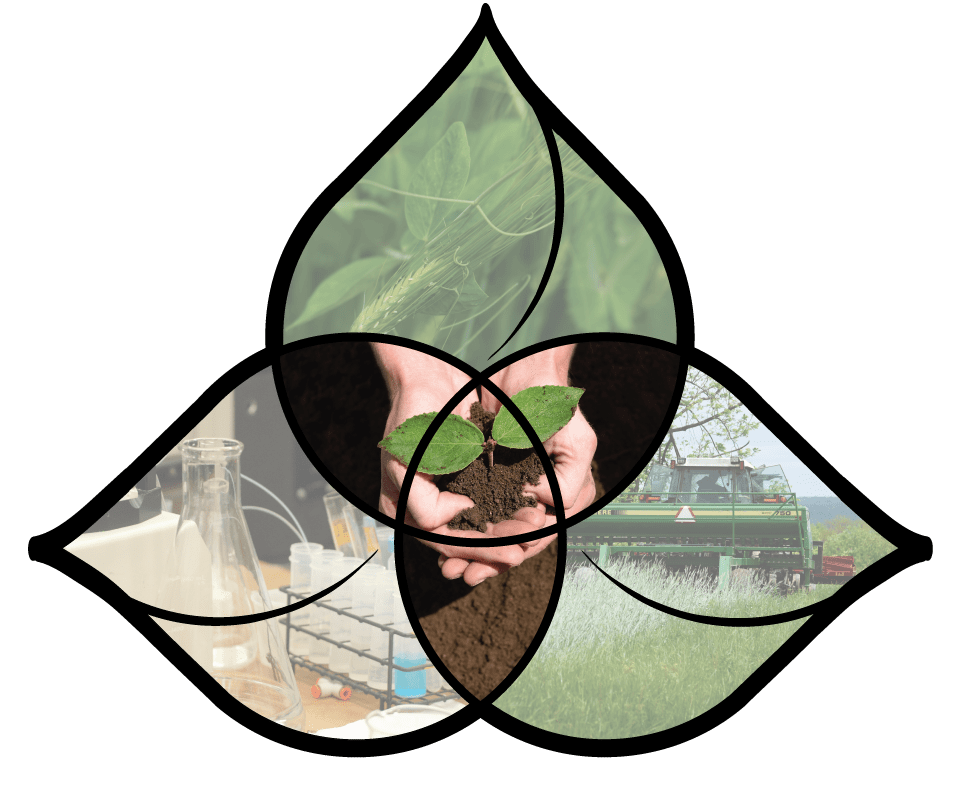
The Cornell Soil Health Testing Laboratory is the home of the Comprehensive Assessment of Soil Health (CASH):
The Comprehensive Assessment of Soil Health is designed for farmers, gardeners, agricultural service providers, landscape managers and researchers who want to go beyond simply testing the nutrient levels of their soils. Visit website.
How to take a soil health sample field sheet and video.
Download the Comprehensive Assessment of Soil Health for viewing online.
Download the Comprehensive Assessment of Soil Health for printing.
Order a hardcopy of the Comprehensive Assessment of Soil Health manual.
Learn more about soil health testing services available at the Cornell Soil Health Lab.
Sustainable Cropping Systems Lab
The lab is located at Cornell University, conducts field research at Cornell’s Musgrave Research Farm in Aurora, NY and with local organic farmers:
The Cornell Sustainable Cropping Systems Lab conducts research on cover crop interseeding, perennial grains, forage intercropping, and more. Visit website.
Cover Crop Guide for New York Vegetable Growers
This is an online tool to help you quickly narrow the choices of cover crop for your situation.
Prof. Thomas Björkman in the Horticulture Section at Cornell University developed this resource. Visit website.
Climate Smart Farming Program
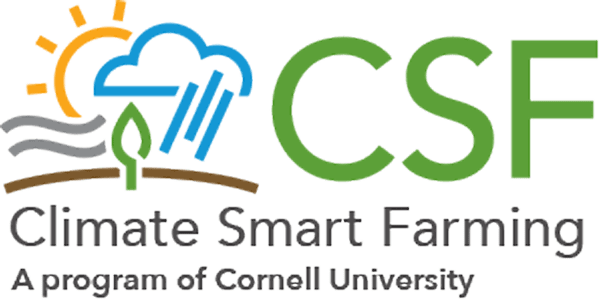
The Climate Smart Farming program; a voluntary initiative that helps farmers in New York and the Northeastern US become more sustainable and adapt to climate change. The site offers a number of climate tools for farmers in the Northeast. Visit website.
Download Cornell CSF Factsheet: Six Key Strategies For Farmers
Download Climate Change Facts, Farming Success in an Uncertain Climate
Download Soil Carbon Management & Greenhouse Gas Mitigation Opportunities
Economic Case Studies & Tools
These economic case studies document adoption of soil health management practices.
Farmer Profile – HaR-Go Farms (NY)
Farmer Profile – Macauley Farms LLC (NY)
Farmer Profile – Gary Swede Farm, LLC (NY)
Farmer Profile – Donn Branton (NY)
Farmer Profile – John Kemmeren Farm – Angel Rose Dairy (NY)
Farmer Profile – Dave Magos (NY)
Farmer Profile – Pedersen Farm (NY)
Adding cover crops to continuous corn with grazing in Missouri
Integrating no-till and cover crops in a corn-corn-wheat double crop soybean furrow roation
Adding cover crops for seed production in Missouri
Tools
Iowa State University provides information and tools for budget analysis to analyze farm business changes that include soil health practices. The Cover Crop Economics Tool is a user-friendly economic assessment tool to assess the costs and benefits of incorporating cover crops into a crop rotation. Made available bythe USDA NRCS of Illinois and Missouri.
Cost Effectiveness in Conservation Programs: Return on Investment for Conservation Practices and Systems. A webinar by economist John Hanchar describing partial budget analysis.
Small Farm Resources
Soil health practices that meet the needs of small-scale farmers include reduced tillage, cover crops, and tarping. Also, the Cornell Small Farms Program is a comprehensive resource for all phases of farm business development.
Here are some resources you might be interested in:
Small Farms Program | Fact Sheet – An informational and management guide for farmers about how to use black plastic tarps to suppress weeds and reduce tillage
Small Farms Program | Reduced Tillage – Reduced tillage practices, along with rotations, cover crops, and amendments, are a way to advance vegetable farms towards greater sustainability.
Small Farms Program | Cover Crops – Cover crops present a myriad of benefits to farmers in terms of soil health, weed suppression, improved water availability, and much more.
Small Farms Program | Manage Weeds with Tarping – Tarping has become a popular practice for small-scale organic farms to manage weeds.
Small Farms Program | On-Farm Tarp Trials – Researchers share farmer experiences with using tarps to suppress weeds and reduce tillage.
Small Farms Quarterly Spring 2019 Article – Learn about farmer experiences using tarps to suppress weed and reduce tillage on organic vegetable farms
eExtension Article – Peer-reviewed data and recommendations to farmers on using reusable black tarps to suppress weeds and make reduced tillage more viable
USDA-SARE Resources
The Sustainable Agriculture Research and Education (SARE) program helps formalize and provide funding for farmer-driven research and also helps publicize the results to other farmers.
Explore SARE’s Learning Center to find out more about soil health and other sustainable practices. Here are a few in-depth resources you might be interested in:
Building Soils for Better Crops – A practical guide to ecological soil management that provides step-by-step information on soil-improving practices as well as in-depth background—from what soil is, to the importance of organic matter.
Managing Cover Crops Profitably – Explores how and why cover crops work, and provides all the information needed to build cover crops into any farming operation.
Crop Rotation on Organic Farms – In-depth review of the applications of crop rotation-including improving soil quality and health, and managing pests, diseases, and weeds.
Steel in the Field – A Farmer’s Guide to Weed Management Tools
Northeast SARE’s network of state coordinators–housed at each land grant university throughout the region–conduct train-the-trainer programs and share information about our grant programs and other sustainable agriculture resources in their respective states. Learn more.
Recursos en español
El suelo nos brinda muchos servicios y es la fundación de nuestro sistema alimentario. El suelo es la base de sistemas productivos y rentables, brindando además importantes servicios ecosistémicos como el almacenaje de carbono y biodiversidad.
GUÍA DEL BIOCHAR PARA USOS AGRÍCOLAS –
Ideas prácticas para aplicar el biochar en cultivos anuales y perennes
Publications
Mason C and D Wolfe. Nov 1, 2018. Survey of vegetable growers and other farmers in New York reveals costs and benefits of soil health practices. VegEdge Newsletter 14(24): 8-9. Cornell University. Ithaca, New York. https://cvp.cce.cornell.edu/newsletter.php.
Mason C and D Wolfe. Nov/Dec 2018. Survey of farmers in New York reveals challenges and opportunities in soil health. What’s Cropping Up? 28(5): 79-89. https://blogs.cornell.edu/whatscroppingup/2018/10/18
Schindelbeck, R., A. Ristow, M. Ryan and H. van Es. 2017. Reduced tillage and cover crops have additive effect for improving soil health. What’s Cropping Up? 27: 37-38. http://blogs.cornell.edu/whatscroppingup/2017/06/07
Organizations focused on soil health
The number of individuals, organizations, and projects focused on soil health in New York is expanding every year. The organizations listed here were included in the 2019 New York Soil Health Roadmap. For more detail on these orgs download this pdf.
American Farmland Trust (AFT)
4R Nutrient Stewardship Program
New York Farm Bureau (NYFB)
New York Soil Health (NYSH)
New York State Soil Health Workgroup (NYSSHWG) (no website)
New York Farm Viability Institute (NYFVI)
The Nature Conservancy (TNC)
New York Higher Education and Research Institutions New York has many higher education and research institutions which are an important resource for soil health programming now and in the future. Cornell’s College of Agriculture and Life Sciences (CALS) is the state’s land grant university and has played a soil health leadership role at the state, national, and international levels since the 1990’s.
Cornell currently provides leadership for the statewide New York Soil Health stakeholder collaboration, and has also coordinated the New York Soil Health Roadmap effort. In addition to Cornell, other universities within the state have faculty with interest and expertise relevant to soil health research, outreach, and/or policy, and educational programs in agricultural or environmental science or other relevant disciplines. This would include SUNY College of Environmental Science and Forestry (ESF), SUNY Cobleskill, SUNY Morrisville, SUNY Binghamton, Columbia University, the Cary Institute, and others.
Sign up for our newsletter!
Don’t miss New York Soil Health news and event notices.
